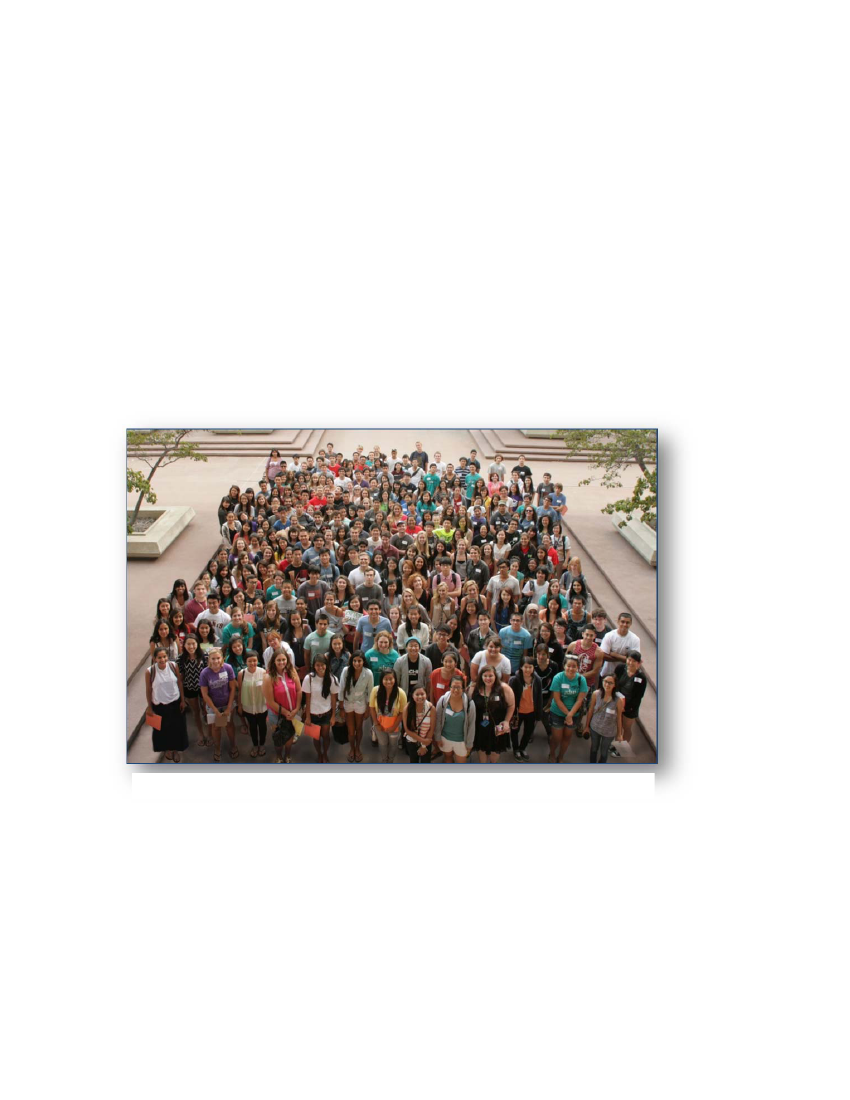Uddannelses- og Forskningsudvalget 2013-14
FIV Alm.del Bilag 103
Offentligt
University of California, IrvineCampuswide Honors Program OverviewIntroductionUC Irvine’s Campuswide Honors Program (CHP), offered to top students in all majorsfrom the freshman through senior years, was founded by the Academic Senate 1986 toattract and retain a greater number of students from the very top tier of those eligible foradmission to the University of California. An immediate goal was the University’s desireto enroll more of the state’s most highly talented high school graduates and to offerthem a substantial and exciting undergraduate experience that would prepare them forprofessional or graduate study. A Ford Foundation Grant proposal, written by UCI faculty,was successful and funded the start of the program. The CHP’s first class of 88 wasadmitted in the fall of 1988.
CHPfreshmenandpeermentorsatfallorientationThe program’s founding vision was to complement the myriad advantages of a majorresearch university with the kind of faculty mentorship and personal attention one finds atthe best liberal arts colleges. The combination image of small college/large university hasguided the CHP in forming honors-level curricula, student advising, and extra-curricularprogramming. Twenty-five years after the arrival of its first class, the program servesapproximately 700 students in all schools and majors. The academic qualifications of thesestudents place them at the top of UC Irvine’s entering class each year.
1
The presence of CHP students on campus has a positive impact on the campus populationas a whole. CHP students become academic leaders in their majors and raise the bar for allstudents. Faculty enjoy teaching and mentoring these outstanding students, which affectsfaculty job satisfaction and retention. CHP students also become some of UC Irvine’s mostsuccessful alumni. The vast majority, 85%, plan to attend graduate or professional schooleither immediately after graduation (33%) or in the future (52%), and are admitted to someof the most prestigious institutions in the country. Many apply for and receive prestigiousscholarships and fellowships, such as the Rhodes Scholarship, the Fulbright Fellowship,the Goldwater Scholarship and NSF graduate fellowships. CHP students, who constituteapproximately 3% of the UC Irvine population, receive more than 48% of such awardsgarnered by UC Irvine undergraduates.
StructureThe Campuswide Honors Program is headed by a faculty Director, who reports to theDean of the Division of Undergraduate Education, Dean Sharon Salinger. The Division ofUndergraduate Education delivers a wide variety of academic programs and servicesthat support undergraduate teaching and learning.The Program’s Academic Senate Charter Document, stipulates that the policy-makingbody of the Program “will be an elected Academic Senate committee.” This board, theHonors Program Board, consists of Senate-appointed faculty, one member from each of theSchools at UC Irvine with undergraduate degree programs. The responsibilities are:●●●To determine admission to the Program, and to determine the policies ofadmission within guidelines;To certify graduation from the Program, and to determine policies relating tograduationTo approve courses and instructors for lower-division courses in the HonorsProgram curriculum, and to determine the policies for same, within adoptedguidelines;To advise the chief administrator of the Honors Program concerning the academicadvising of students in the Program or enrolled in its courses, recruitment of suchstudents, extracurricular opportunities and academic perquisites for Honors Programstudents.
●
The staffing of the CHP is as follows:Director, Ted Wright, Professor of Cognitive Sciences (2012-present)Associate Director, Lisa Roetzel, Ph.D. (2005-present)Senior Honors Academic Advisor, Mary Gillis, M.A. (2009-present) HonorsAdvisor, Christina Treble, B.A. (2012-present)Office Manager (Provides program and administrative support. Currently hiring for this position.)
2
Previous faculty directors within the 10-year review period:Roger McWilliams, Professor of Physics and Astronomy (Founding Director from 1987-2009)Gail Hart, Professor of European Languages and Studies (CHP Director from 2009-2012)
Staff reduction within the review period:Programmer Analyst, ½ position centralized to Office of Information Technology in 2012Curriculum
The Campuswide Honors Program provides a central core of academic coursesdesigned to challenge students by exposing them to some of UCI’s best and mostexciting faculty, while introducing important topics, issues and methods of inquiry acrossdisciplines. The CHP core course sequences are interdisciplinary in nature and oftenteam-taught. The required core constitute approximately 25-30% of a student’s total coursework of a minimum of 180 quarter units, in line with the best practices outlined by the NationalCollegiate Honors Council, the nation’s professional organization for honors programs andhonors colleges.
Rather than allowing students to choose courses freely from a menu of honors course, theCHP has chosen to provide a common curriculum of three, year-long course sequences inorder to create a community of learners. CHP students from majors throughout thecampus come together for the CHP core courses, bringing multiple perspectives to theirstudies. These courses provide breadth of study that complements the depth thatstudents experience in the major and in undergraduate research. CHP courses fulfill mostof the General Education requirements for UCI students so that students will not bedelayed in progress toward degree. In the 3rd and 4th year, students engage in thecapstone project of faculty mentored research, culminating in a senior thesis or creativeproject.
Two of the CHP’s Student Learning Outcomes speak to the importance of balancing afacility with thinking across disciplines with depth of study:●Students who participate in the CHP will broaden their knowledge and see theimportance of other disciplinary experience by taking honors level curriculum in avariety of fields.Graduates of the CHP have deepened their knowledge by engaging in differentstages of undergraduate research, with the culmination of an honors thesis orcreative project.
●
3
CHP Core Courses are designed to help students develop and sharpen their reading,writing, mathematical, analytical, and communication skills.1) Honors Humanities Core (Humanities H1A-H1B-H1C).
This year-long sequence isteam-taught by faculty from the various Humanities disciplines (English and ComparativeLiterature, History, and Philosophy, for example), and is organized around major themes,which change every 3 years. The current theme is "War" which looks at ways in whichpeople have represented, rationalized, propagandized, memorialized, evaluated, orunderstood for themselves or others, the human activity of war. Throughout the year thecourse explores various sub-themes and concepts, while teaching college writing skills. Bythe end of the course students write their first major college-level research paper.Honors discussion sections are taught by faculty and lecturers (not teaching assistants). (8units/quarter)2) Honors Social Science Core (Critical Issues in the Social Sciences). Offered
as Social Sciences H1G-H1F-H1E.
This year-long sequence is team-taught by professorsfrom the Schools of Social Science and Social Ecology. The topics presented in thissequence are studied from the perspectives of various social science disciplines, includinganthropology, cognitive sciences, economics, epistemology, international studies, urbanstudies, linguistics, political science, psychology, sociology and urban studies. Sampletopics have included authority, (dis)obedience and human society; decisions,compromises, and their rewards and penalties; the view of human knowledge as anongoing process of belief revision and problem solving; human vision/perception, learningand memory; human language - how do we learn it and what is its effect on our acquisitionof knowledge; and exotic societies (including our own). (6 units/quarter)
Honors Science Core (The Idiom and Practice of Science). Offered as Biology,
Chemistry, Earth System Sciences, Mathematics, or Physics H90.
This year-longsequence gives students an understanding of the role science plays in addressing sociallysignificant problems. Students develop the ability to understand scientific models and tojudge the content, merit, and limitations of many issues of science in the modern world.Emphasis is placed upon the development of analytical and writing skills. Topics haveincluded ozone depletion/global warming, earthquakes, biodiversity/conservation, geneticevolution/aging,plant engineering, calculus and partial differential equations,radiation/diseases, the mathematics of power, and the physics of music. (4 units/quarter)ORHonors General Chemistry
(for CHP science majors who are required by their major to take three quarters ofgeneral chemistry, plus labs; usually taken freshman year)4
This sequence covers similar topics to the non-honors equivalent (Chemistry 1A-1B-1C,plus labs), but offers smaller class sizes, provides opportunities for increased interactionwith faculty, and covers material in greater depth. This sequence is required of all CHPstudents who have majors in Biological Sciences, Public Health Science, PharmaceuticalSciences, Chemistry, certain other fields in the Physical Sciences (Earth &Environmental Sciences and Earth & Environmental Studies), and certain fields inEngineering, etc. (6 units/quarter)
3) The Research/Thesis or Creative Project requirement:
In addition to the requiredhonors core courses, CHP students participate in a minimum of two quarters of researchunder the direction of a faculty mentor. This experience culminates in the production of anhonors thesis, creative project, or publication-quality paper. Most students actually endup spending three or more quarters on their research/thesis experience. How much time willdepend upon the discipline in which a student elects to do their research, thearrangements they make with their faculty mentors, and often, the nature of the projectitself. All CHP students are encouraged to present their finding at the campus’ annualUndergraduate Research Symposium.Upper Division Honors Research Seminars (added in 2010).
These seminars, taughtby a faculty research scholar, engage a small number of students (20-22 or fewer) in aserious and multi-faceted examination of a topic of the instructor’s choosing. This topicreflects the instructor’s ongoing research and may encompass several disciplines orsub-disciplines. By modeling research methodologies and the intricacies of formulating andaddressing research questions, the research seminars can serve as preparation for thehonors thesis. Research seminars completed with a grade of C or better may besubstituted for one quarter of the CHP core course sequence. (4 units/quarter)The CHP encourages students to participate in their school or major upper-divisionhonors program, which generally focus on research and thesis. The thesis that isproduced through these programs is accepted as the CHP thesis. For those studentsunable to participate in a school or major honors program, CHP Director Ted Wright ispiloting a new 2-credit, 2-quarter course this year calledCHP Honors Thesis
intended tosupport students in the thesis process. (This is in addition to the guidance they are receivingfrom their faculty mentor.)Advising
The CHP “advising system” was designed to provide a comprehensive support system for allstudents in the program, from freshman year to graduation. Additional goals are to providethe level of support and personal attention which normally would be found at a smallliberal arts college, and to make sure that students are notified of and encouraged totake advantage of opportunities on a timely basis. These opportunities include prestigiousscholarships, internships, and education abroad, as well as work and/or researchopportunities.5
The CHP has two full time honors advisors, a Senior Academic Advisor, and anAcademic Advisor, who serve approximately 700 active CHP students annually. Fourstudent Peer Academic Advisors assist the professional Advisors by providing advising onroutine matters and helping plan events. For major or school specific advising, eachacademic unit on campus (there are nine schools with undergraduates, as well as theDivision of Undergraduate Education, and the majors related to Health Sciences) has adesignated “honors” advisor, with whom the CHP advising office coordinates advisingefforts.The Senior Honors Advisor oversees the CHP advising staff, and plans the annualadvising calendar that is followed by CHP advising staff. There is an advising calendarfor students entering as freshmen and a separate one for transfer students. Current UCIstudents who enter by application are integrated into the advising plan/calendar. Studentsreceive special advising about the CHP and its requirements during the campus’ SummerOrientation (SPOP). During Welcome Week in the fall, CHP Peer Advisors assist withsmall-group advising for incoming freshmen, and all new students attend a required groupCHP Orientation (separate orientations for new freshmen and new transfer students).One-on-one advising, group advising, and workshops take place throughout the academicyear. Walk-in advising is available daily. In addition to providing advising services, theCHP sends out a weekly electronic newsletter, CHP News, which informs students aboutimportant opportunities and deadlines, both internal to the CHP, and for the greatercampus, including the Undergraduate Research Opportunities Program, the ScholarshipOpportunities Program, Study Abroad, UCDC and UC Sacramento.CHP students are required to submit a course plan through graduation during their firstyear in the honors program. Having a course plan encourages students to think broadlyabout their education and plan ahead to avoid scheduling bottlenecks, especially if theyare considering study abroad or a double major. These plans must be approved by the“honors” advisor in the student’s school or major.In addition to providing academic advising, CHP academic advisors mentor CHP studentleaders such as officers of the Campuswide Honors Student Council and the ResidentAssistants in honors housing. They also monitor student progress, maintain studentrecords, and follow up with the student regarding any problems.Academic advisors and other CHP staff communicate regularly with students, eitherin-person, by phone or electronically. They visit honors housing and attend many of the CHPstudent events that take place each year. The CHP staff have set up several Facebookgroups for CHP students and alumni, and a blog on leadership development has beendeveloped for the leadership of the Campuswide Honors Student Council. The PeerAcademic Advisors have developed their own blog of advice for students. The CHPwebsite contains further information including the CHP Student Handbook and the CHP6
Research/Thesis Handbook. These documents contain useful information about the CHPand its requirements and policies, CHP and other on-campus resources, programs, andopportunities, and other important procedures and guidelines.
Student Life
Active learning and participatory education are considered best practices in honorseducation by the National Collegiate Honors Council, the national professional organizationfor honors colleges and honors programs. In the Campuswide Honors Program,co-curricular and extra-curricular activities help build a community of scholars and enhancethe learning experience.Among the CHP’s Student Learning Outcomes is one related to acquiring leadershipexperience:●Students who participate in CHP extra-curricular activities learn how to organize,work, and lead in teams, and recognize the benefits of complementing academicstudies with those activities.An important feature of student life in the CHP is that older students mentor students newto the program. A system has been developed whereby students begin as freshmen withless complex duties and are mentored by older students to grow into positions of leadership.
The Campuswide Honors Student Council (CHSC) is one vehicle for students to getinvolved and gain valuable organizational and leadership experience that translates intotheir schoolwork and their future careers. The CHSC is the CHP’s student-run organizationthat plans many of the approximately 80 events and programs that take place each year.Ideas for events and programs are generated by CHP students, which leads to a highlevel of participation and buy-in. The CHSC leadership are advised by the HonorsAdvisor, who attends meetings and events and mentors student leaders in one-on-onemeetings, group meetings, and through a CHP leaders blog.Students have arranged weekly Coffee Hours, fireside chats with faculty on such topicsas “What to expect of your 21st Century Education” or the viewing and interpretation ofa film, special tours such faculty-guided visits to the UCI Arboretum, a workshop aCognitive Sciences faculty member on study skills, trips to the theater, barbecues,sporting events, dances, and community service opportunities. The CHSC is alsoresponsible for organizing the End of the Year Banquet, which celebrates graduatingseniors. The CHP also has a Peer Mentor program, where current students volunteer tomentor an incoming freshman or transfer student. Peer Mentors contact newfreshmen/transfer students in the summer prior to matriculation and help answer theirquestions. They remain in contact with the new students during the year to facilitate theirtransition to UCI and the CHP.
The Honors Advisor, who regularly attends meetings and events, advises the CHSC7
and the CHP Resident Assistants in honors housing, and oversees the Peer Mentorprogram. Aside from planning various social events, the members of the CHSC are alsoavailable to help with recruiting and orientation events. 80-100 CHP students typicallyvolunteer for the program’s annual recruitment day for prospective freshmen (HonorsExperience Day) as panelists, minglers, registration volunteers, photographers, and more.
Another important component of CHP student life is honors housing. There are currentlytwo honors residence halls for freshmen, “The Shire” in the Middle Earth Housingcomplex, and “Loma” in Mesa Court Housing, with the potential to expand into “Arroyo” inyears when there is high demand for honors housing (3 out of past 5 years).Upperclassmen have the option of living in CHP houses in Arroyo Vista. The CHP has 4houses in that complex, down from 6 houses during the years of the previous review.(Additional apartment-style housing added to the campus in recent years is highly popular,and draw some students from honors housing.) Commuter students who would like tobecome part of a housing community may be “adopted” by a CHP residential community,and are invited to all events and activities. CHP students in housing are mentored byResident Assistants, who are CHP upperclassmen who have come up through the program.CHP students in good standing are guaranteed a place in campus housing until graduation,as long as they follow the Housing Office’s policies and deadlines.One of the major goals for honors housing is to facilitate the growth and developmentof a “community of scholars.” This unique living/learning environment provides a venuewhere honors students can live with their peers. Honors housing also serves as thelocation of many of the CHP’s events, which all CHP students are invited to attend. In thisenvironment, students have opportunities for mentoring, tutoring, study groups, andstudent/faculty and student/staff activities. Honors Housing also has a positive impact onthe development of social and interpersonal skills and also on academic and intellectualcollaboration with fellow CHP students and faculty within the classroom.The final component of student life is provided directly by the CHP office staff and thePeer Academic Advisors. Certain major events, such as the fall and spring bonfires at thebeach and the annual camping retreat are planned by this group.Student Selection
Faculty on the Academic Senate’s Campuswide Honors Program Board, which is part ofthe Council on Student Experience of the Irvine Division of the Academic Senate, select theCampuswide Honors Program students. The Board consists of a member of each schoolthat has an undergraduate degree program, plus a representative from the Health Sciencesmajors. The Dean of Undergraduate Education selects Undecided Undeclared students.
8
The members of the Honors Program Board for 2013-14 are:School of the ArtsSchool of Biological SciencesMerage School of BusinessSamueli School of EngineeringHealth Sciences majorsSchool of HumanitiesBren School of ICSSchool of Physical SciencesSchool of Social EcologySchool of Social SciencesUndergraduate Student RepresentativeStudents may enter the CHP in three ways:
Incoming freshmen.
The majority of CHP students enter as incoming freshmen. The size ofthe incoming freshman class ranges from 160-200 students. Incoming freshmen areselected by the Honors Program Board in early winter quarter from the pool of applicants toUCI. Students at this level are sought after by many colleges and are difficult to recruit.Admission to the Campuswide Honors Program is a benefit that helps attract top students toUC Irvine.From the total pool of UC Irvine applicants, a sorting formula that includes SAT scores andhigh school GPA is used to identify the top 7,000 applicants to UC Irvine. From this pool,each member of the Honors Program Board receives a list of top applicants to theirparticular school. In addition to these scores, the faculty on the Honors Program Boardhave within the past 5 years added new data points, including the high school AcademicPerformance Index (API Score) and the Admissions “read score.” Honors ProgramBoard members are also offered access to the electronic application.Each Honors Program Board member is given a target number of students to select,which is based on the relative size of the school’s student population in relation to theuniversity as a whole. In this way, selected students are distributed throughout the universityand are not concentrated in a single major or school. In addition to the schools, aselection is made for Undecided/Undeclared students by the Dean of UndergraduateEducation. Students selected for the CHP and admitted to UC Irvine are then givenspecial attention by the CHP staff and the Office of Admissions, including CHP specificletters, brochures, emails, and recruitment events. These recruiting efforts help bringoutstanding students to majors throughout the campus.Professor Cecilia SunProfessor Melanie Cocco (Chair)Professor David HirshleiferProfessor R. Jay JayakrishnanProfessor Andrej LuptakProfessor Catherine Benamou and ComputerDavid Kay, Senior Lecturer SOEProfessor Jack XinProfessor Jodi QuasProfessor James WeatherallDaniel Ho, CHP 3rd year student
Incoming transfer students
are eligible for a special program called Honors to Honors,which is available to students attending honors programs in 15 partner community9colleges. Students in these colleges who have completed their honors program with a 3.7GPA or better can be nominated by their community college honors director for Honorsto Honors. If admitted to UC Irvine, Honors to Honors students receive automatic admissionto the CHP, and are given priority consideration for the Regents’ scholarship. This programhas resulted in approximately 20-25 outstanding transfer students choosing UCI each year,and has increased the number of transfer students in the CHP. Transfer students who arenot eligible for Honors to Honors may apply to the CHP if they have a 3.5 GPA orbetter, and are allowed to apply in the summer prior to matriculation.
Current UCI Students
may apply to join the CHP if they meet theminimumrequirementof a UCI GPA of 3.5 and a course of study that would accommodate the CHP curricularrequirements. The application form is available online, and is accepted throughout theyear, including in the summer. Students may apply until the end of the fall quarter of theirjunior year. Decisions on these applications are made by the Faculty Director and theAssociate Director in consultation with the honors advisors.Scholarships available to incoming students.
The Regents’ Scholarship, the campus’most prestigious merit scholarship, is administered by the Office of Financial Aid andScholarships, and students are selected in a separate process from the CHP selection. Dueto limited funding for the Regents’ Scholarship program, not all incoming CHP studentsare offered Regents’ scholarships. The CHP Director also oversees an endowedscholarship fund, the Distinguished Honors Scholarship that offers one four-yearscholarship to an incoming freshman. Students are also eligible to apply for merit basedscholarships through the Office of Financial Aid and Scholarships.Alumni
The CHP has made the development of a strong alumni program one of its central goals.CHP alumni identify with the program, and are very attached to it. In fact, for many, theCHP is their central point of relationship with UC Irvine. Maintaining relationships with thosealumni thus benefits both the CHP and the campus.There are now over 2,700 CHP alumni who can be found throughout the nation and theworld. Many are among UC Irvine’s most successful graduates, and include creative artists,engineers, entrepreneurs, lawyers, physicians, researchers, teachers, and informationtechnology and other technology professionals. Many attend prestigious graduate andprofessional schools throughout the world, and win prestigious scholarships. Their livesreflect the final CHP Student Learning Outcome:
●
Upon successful completion of the CHP, students are equipped with the skills,knowledge, and experience to set and attain challenging goals.
The CHP office fosters alumni relations through regular contact, and updates alumni10
records regularly to ensure that the most accurate contact information possible is available.The program has an alumni chapter in the UCI Alumni Association, and new CHP alumnigroup in northern California has also recently been formed.
Maintaining relationships with alumni has been beneficial for fundraising, recruitment, andnetworking. Alumni participate in career panels that inform students about differentprofessional paths, network with students, volunteer to be a point of contact for studentsapplying to graduate school, and participate in fun events that bring them back to thecampus.Within the last 10 years, the CHP alumni and staff set the goal of creating an endowmentfor the program. Under the leadership of alumni from the early years of the program, thisgroup worked with CHP staff in 2005 to raise funds to create an endowment for the CHP.This goal has been achieved, and for the program’s 25th Anniversary year this year,alumni are working to double the endowment to $50,000. For a program with young alumni(the oldest CHP alumni are in their mid-40s), this is a significant accomplishment.The CHP office communicates with alumni via the CHP alumni listserv, a CHP alumniFacebook group, a CHP alumni Twitter account, and a biannual newsletter. There is also aspecial alumni section on the CHP webpage. The newsletter that is mailed in Decemberincludes a fundraising appeal, and a letter from the Director and Associate Director. Thisannual campaign raises funds to help support some of the CHP co-curricular andextra-curricular activities that enhance the educational experience, and which are notsupported by state funds. These include the weekly Coffee Hour, visits to plays andconcerts, and the annual camping retreat.
11











